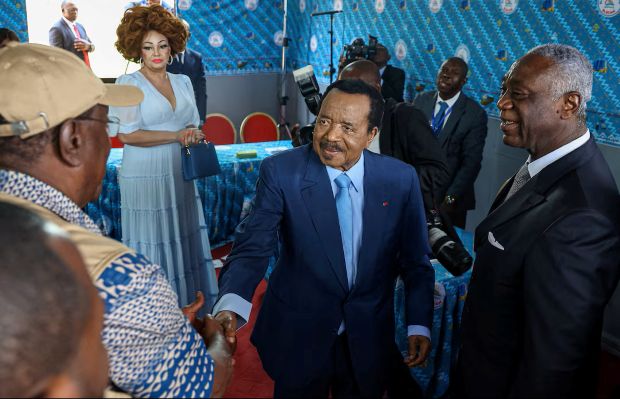Paul Biya, world’s oldest president, extends rule over Cameroon
By Ruth Maclean and Saikou Jammeh
DAKAR — The world’s oldest president on record, Paul Biya, was declared the winner on Monday (27) of Cameroon’s presidential election with nearly 54% of the vote, securing an eighth term that, if completed, will last until he is nearly 100.
Cameroon’s electoral body declared the results for Biya, 92, in defiance of an opposition candidate who claimed victory two days after the Oct. 12 election, alleging widespread fraud in what he called a “predatory oligarchy”.
The election was the most consequential in the Central African country in decades, analysts said. The results were the closest for Biya since 1992.
Cameroon provides the starkest example on the continent of a country of young people ruled by leaders from a bygone era. The median age in 2024 was 18.9. Biya has made no known plan for succession. He came to power in 1982, before many Cameroonians were born.
But a political crisis could be on the horizon. Many young Cameroonians have refused to accept the results, and the fraud claims could fuel the kind of Gen Z mass protests erupting elsewhere on the continent over governments’ failure to create economic opportunities for young people.
Biya has also spent long periods outside the country, making frequent trips to Switzerland with a large entourage and racking up hotel bills that one investigation estimated totalled around $65 million, adding to the resentment.
Since Election Day, tensions have stretched across Cameroon. Security forces have been on high alert as widespread allegations of fraud prompted protests in Yaoundé and other cities. Four people were killed in protests on Sunday (26) in Douala, the economic capital, according to regional authorities, who said members of the security forces also were wounded.
Nkongho Felix Agbor-Balla, a leading Cameroonian human rights lawyer, said that Biya could not have won without “massive fraud”.
“This election is more of a protest vote,” he said. “People just wanted change, not just because of Biya’s age, but also because nothing is working in the country.”
The generational disconnect has even touched the first family. Biya was openly condemned by his own daughter, Brenda Biya, who told her TikTok followers not to vote for her father, who she said had made the nation suffer for years.
Biya is one of several leaders well over the age of 70 across Africa. On Saturday (25), Ivory Coast held an election in which the president, 83-year-old Alassane Ouattara, was competing for a fourth term, despite the Ivorian Constitution limiting presidents to two. (Because of a constitutional amendment, Ouattara reset the clock on his term.)
Seventeen of the continent’s leaders are over 70, while the median age in Africa is 19.
Even Biya’s main challenger in the race, Issa Tchiroma Bakary, is 76. Until June, Tchiroma Bakary was a Biya loyalist, serving as a minister for years. He earned 35% of the vote, according to official results released Monday. The leading opposition figure, Maurice Kamto, 71, was barred from running by the electoral commission.
Tchiroma Bakary claimed two days after the election that he had won in a landslide, and threatened to call for mass street protests against Biya.
“We will not accept our victory to be stolen from us,” he said last week. “The people will not stand for it. The people are determined to fight against a regime that is deaf to their suffering and difficulties.”
Biya has dealt with such opposition before. A day after the last election, in 2018, Kamto also claimed victory. After he denounced the results as fraudulent and led protests, Kamto was arrested and spent nine months in jail.
Over the past four decades, Biya has faced all manner of challenges, including a 1984 coup attempt by the presidential guard, a secessionist movement that has destabilized the country’s English-speaking regions since 2016 and factional battles inside his own party, the Cameroon People’s Democratic Movement.
Throughout, he has tightened his iron grip on power, repressing the opposition, removing guardrails against electoral fraud and, in 2008, removing presidential term limits. To remain in power for four decades, analysts say, Biya has prevented coup attempts by keeping tight control over the military.
While governments in the nearby Sahel region were toppled by coups in recent years, Biya has survived.
Analysts say that the greatest danger to his rule may not come from rivals like Tchiroma Bakary, but from within the political vacuum his longevity has created. With no known succession plan in place, some analysts suggest that Biya may be quietly grooming his son, Franck Biya.
“He is old, he’s unhealthy,” said Hubert Kinkoh, an analyst. “If he should die in office, there is no clear successor. So, there’s a risk of political struggles.”
Chuo Walters, a lawyer and university professor who favours Biya, compared the situation to that of Gabon’s former president, Omar Bongo, who died of a heart attack at 73, after 41 years in power. Bongo was succeeded by his son.
But nobody knows what Biya is planning, Walters said. “He’s a very discreet man and he always likes to surprise people.”
-New York Times



Comments are closed, but trackbacks and pingbacks are open.